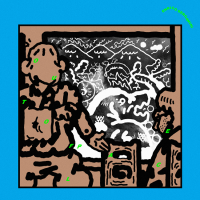Home » Jazz Articles » Album Review » Roxy Coss: Chasing the Unicorn
Roxy Coss: Chasing the Unicorn
Known largely for her work with trumpeter Jeremy Pelt, Coss developed rapidly as a leader, and more importantly, as a composer, during her quintet's three year residency at New York's famed Smoke Jazz Club. Her musical relationship with guitarist Alex Wintz prompted a change in her approach to the traditional jazz quintet, replacing the trumpet with guitar, creating a front line partner with greater harmonic and melodic versatility.
On this recording, she adds pianist Glenn Zaleski, who dwells in the modern aesthetic territory of pianists such as Brad Mehldau while echoing influences of the great Bill Evans. This is equatable to the leader Coss, who can't seem to shake the tethers tied to masters like Wayne Shorter and Joe Henderson in her pursuit of her own distinctive sound. That being said, she achieves a wonderful blend of lyricism and inspired intensity throughout her solos on both tenor and soprano saxophones, and on her interpretation of Wayne Shorter's classic hard bop ballad, "Virgo," a daunting and pensive bass clarinet.
New York firebrands, bassist Rick Rosato, and drummer Jimmy Macbride round out the quintet, and deliver as one would expect. Rosato's lovely tone, sense of timing, form, and melodic invention underpins the foundational pulse of MacBride's fluid playing, echoing the percussive sentiments of his mentor, Kenny Washington.
Coss leads the way on the title track, with a winding angular melody on soprano, switching to a harmonic role mid piece on bass clarinet. The piece personifies Coss' compositional prowess, and the wonderful rapport this quintet attains throughout this recording. Rosato and Macbride maintain the balance between form and spontaneous invention, enabling Wintz to play the role as counterpoint foil for Coss, and blending ever so deftly with pianist Zaleski to create a layered approach to harmony. Coss' original pieces are worthy palettes for musical interpretation, and throughout the course of her three albums Roxy Coss (Self Produced, 2010), Restless Idealism (Origin, 2016), and now Chasing the Unicorn, they are seemingly fleeing the constraint of her ever evolving hard bop notions of uniformity. "Free to Be" personifies this continually liberating progression for Coss, building the melody off of a melodic triad with Wintz and Zaleski. Her soprano solo builds to an improvised counterpoint exchange with Wintz, that is validation of Coss' audible vision of what she wants her quintet to sound like. Any notion that eschewing the traditional jazz quintet front line with trumpet as some sort of trivial maneuver to establish uniqueness is vanquished. Her musical bond with Wintz is comparable with any saxophone/trumpet pairing, with the added chordal, harmonic dimensional rapport.
Coss' decision to cover the Lennon/McCartney classic, "Oh! Darling" makes perfect sense, being that it is built on the blues, an aspect of Coss' personal approach that is offered in exquisite fashion by her probing and soulful tenor.
The aforementioned foray into Shorter's "Virgo" displays the artist's versatility in this interpretive rendition delivered on bass clarinet. One of Shorter's more tender melodies is sublimely treated with emotive phrasing and a deep, pulsing tone, adrift with relentless romanticism.
Roxy Coss' understanding of the jazz language, of identifying her personal approach as a leader continues to progress, or rather advance, utilizing giant strides rather than short, measured steps. Sure, she has spent ten years now in New York, ten years away from the west coast stronghold of jazz that is her native Seattle. In traditional terms, she has paid her dues. She has been able to create art that is emblematic of her upbringing, being the daughter of brilliant sculptor, and light and sound artist, Mary Coss. She has done so with a tenor saxophone and a passionate allegiance to the masters that have paved the way. She is willing to escape the boundaries of her fears, and continue to endeavor into that which is mythical in vision, yet tangible in form. Chasing the Unicorn is a reflection of just that.
Track Listing
Chasing the Unicorn; A Shade of Jade; You're There; Free to Be; Oh! Darling; Never Enough; Virgo; Unwavering Optimism; Benny's Tune; Endless Cycle; Crazy
Personnel
Roxy Coss
saxophone, tenorRoxy Coss: tenor and soprano saxophones, bass clarinet; Alex Wintz: guitar; Glenn Zaleski: piano; Rick Rosato: bass; Jimmy Macbride: drums.
Album information
Title: Chasing the Unicorn | Year Released: 2017 | Record Label: Posi-Tone Records
Tags
PREVIOUS / NEXT
Support All About Jazz
 All About Jazz has been a pillar of jazz since 1995, championing it as an art form and, more importantly, supporting the musicians who make it. Our enduring commitment has made "AAJ" one of the most culturally important websites of its kind, read by hundreds of thousands of fans, musicians and industry figures every month.
All About Jazz has been a pillar of jazz since 1995, championing it as an art form and, more importantly, supporting the musicians who make it. Our enduring commitment has made "AAJ" one of the most culturally important websites of its kind, read by hundreds of thousands of fans, musicians and industry figures every month.





















